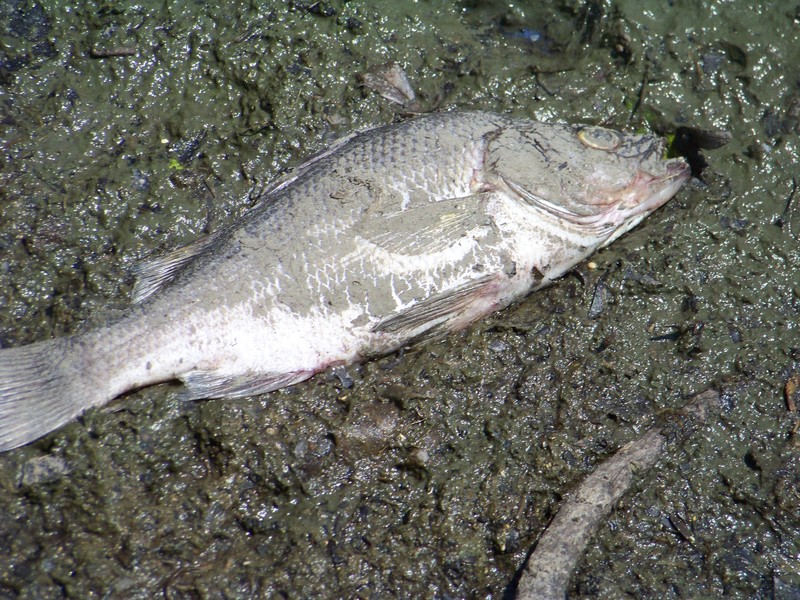Update: Low oxygen likely cause of Silver Lake fish kill

Intense heat and low dissolved-oxygen levels are the likely causes of a large fish kill in Rehoboth Beach’s Silver Lake.
Hundreds of dead fish could be seen floating from the Bayard Avenue bridge to Rehoboth Elementary School July 4, most appearing to be small perch or bass.
Rehoboth City Manager Greg Ferrese said the Department of Natural Resources and Environmental Control’s Division of Fish and Wildlife were called about 7 a.m. and responded that day.
Michael Globetti, spokesman for DNREC, said while no official cause has been determined, the most likely cause is the intense summer heat and low dissolved-oxygen levels. Globetti said DNREC has taken samples from the lake and is still investigating the cause of the kill.
Mayor Sam Cooper said city crews will be out Friday, July 6, at 6 a.m. to clean up the dead fish. Cooper said hot weather could have created the right conditions to cause the oxygen levels in the water to drop.
The last fish kill at Silver Lake was April 26, 2008, when low dissolved-oxygen levels decimated the lake’s largemouth bass population.
Todd Fritchman of Envirotech reported the 2008 fish kill and speculated that similar factors may be at work in this kill. He said the hotter the water, the less dissolved oxygen the lake will hold. Fritchman said other factors could be sediment buildup from runoff and bacteria blooms.
Sallie Forman, president of Save Our Lakes Alliance3, said, “The fish kill at Silver Lake was a problem waiting to happen. Since the spring we have had little rain, temperatures above 90, and evaporation of the lake water. All the while pollutants, such as nitrogen and phosphorus, continue to flow into the lake from stormwater drains and runoff.”
She said these nutrients create algae blooms that deplete the oxygen, making the aquatic ecosystem a dead zone.
Forman said SOLA3 has asked the city to enforce state regulations requiring builders to use best management practices to control runoff.
“We encourage residents to use products that do not contain nitrogen and phosphorous and to establish natural riparian buffers along their lake front properties to filter out harmful pollutants and provide a natural habitat for wildlife,” she said.
Dredging likely
Many of the fish that were killed washed up in the western end of Silver Lake, which has been plagued by sediment buildup from runoff, leaving the water shallow.
The good news for the lake is the General Assembly has allocated $200,000 in the 2013 Bond Bill for dredging three feet of sediment from the west end of Silver Lake. How soon the project gets started is still up in the air.
Rep. Pete Schwartzkopf, D-Rehoboth Beach said the dredging would happen, although there are some kinks to be worked out.
“We’re going to get our money. Trust me,” he said.
One of the things still to be worked out is the additional $100,000 needed to complete the estimated $300,000 project. Cooper said the city would contribute to the project.
“It’s important,” he said.
The city has a contingency of more than $100,000, in addition to reserves, Cooper said.
“If it’s important, we’ll find the money for it,” he said.
Department of Natural Resources and Environmental Control Secretary Collin O’Mara said the department has begun some of the permitting and scoping work while financing is worked out. O’Mara said he hopes to have a better cost estimate for the project within the next three months.
“We can’t start until the late fall at the earliest. We’ll see progress in the next year. From my point of view, the status quo isn’t acceptable. It is among our top handful of dredging priorities right now,” he said.
Forman said the project could begin as early as the fall of 2012.
“Removing three feet of the sediment from Scarborough to the far west end will provide deeper water, replacing the existing mud flats,” she said.
Forman said dredging will not eliminate future fish kills, but deeper water can provide more oxygen for wildlife.
Cooper said dredging would have helped, but might not have prevented the fish kill. He said he will propose putting aerators at the west end, devices that pump diffused oxygen into the water, similar to what the city installed at Lake Gerar. Cooper said the west finger of the lake would benefit greatly from adding additional oxygen.
Forman said, “There is just too much nutrient load in Silver Lake that has accumulated over decades to totally prevent future kills. If residents and the city of Rehoboth would commit to reducing these pollutants, that would go a long way to assure that the condition of Silver Lake's water does not get worse.”
Ryan Mavity covers Milton and the court system. He is married to Rachel Swick Mavity and has two kids, Alex and Jane. Ryan started with the Cape Gazette all the way back in February 2007, previously covering the City of Rehoboth Beach. A native of Easton, Md. and graduate of Towson University, Ryan enjoys watching the Baltimore Ravens, Washington Capitals and Baltimore Orioles in his spare time.














































